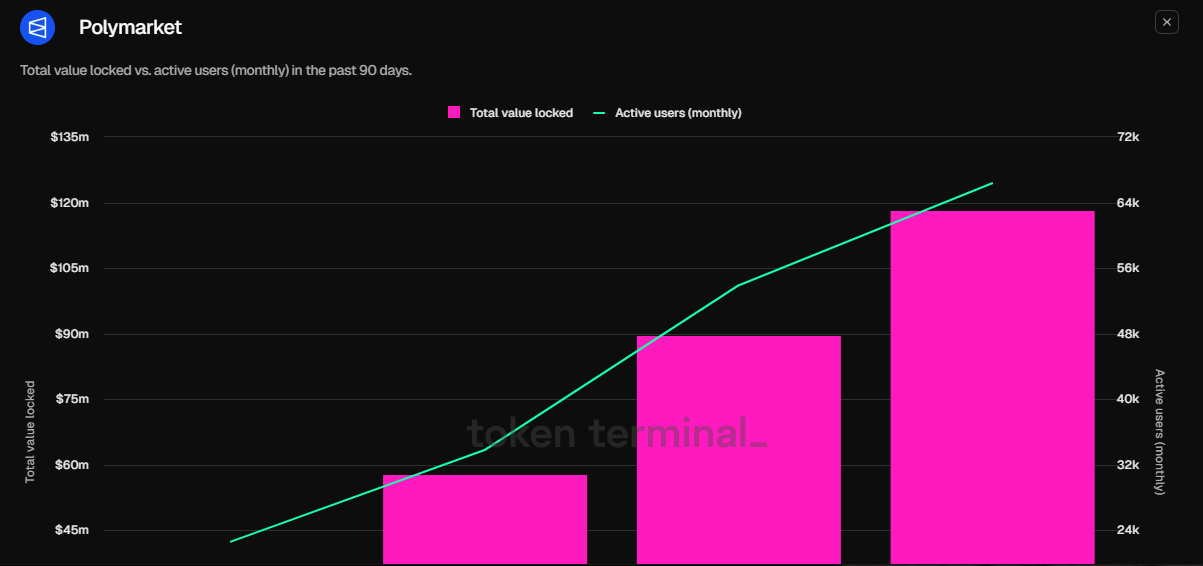Polymarket Election Bets Volume Approaches $1 Billion

Polymarket continues to record growing popularity amid US election buzz. Bettor’s interest in the decentralized prediction market is frothing, seen with the volume of bets as participants predict possible outcomes.
While popularity grows, regulatory scrutiny is also increasing, with the mounting pressure affecting platform activity.
Polymarket Elections Bets Near $1 Billion
Polymarket election bets volume recorded $926 million as of this writing, indicating growing interest in the decentralized prediction market. With the US elections just 48 days away, the volume is expected to hit $1 billion soon.
Data from Dune shows that nearly 70% of Polymarket’s weekly users are focused on election-related bets, while non-election users make up the remaining 30%. This highlights the central role of political events in driving engagement on the platform.

Election vs. Non-Election Users on Polymarket, Source: Dune
Read more: Top 9 Web3 Projects That Are Revolutionizing the Industry
Other key Polymarket metrics have shown significant growth. The platform’s total value locked (TVL) has increased by 277% since June, reaching nearly $120 million. Additionally, the number of monthly active users surged by 50%, climbing to 66,400 during the same period.

Polymarket TVL. Source: Token Terminal
The growing adoption of Polymarket by mainstream companies underscores its seamless fit within various industries, demonstrating the rising influence of blockchain technology due to its efficiency. This explains Bloomberg’s recent integration of Polymarket into its Terminal, as decentralized prediction platforms play a more visible role in the upcoming November elections.
Coinbase executive Yuga Cohler highlighted the importance of prediction markets, calling them “the purest technological manifestation of liberal democracy.”
“Polymarket’s astronomical success is the most important story in crypto right now, but it’s so obvious that we are ignoring it when we should be screaming it from the rooftops. It is monumental for crypto that Polymarket is being consistently cited by mainstream media for election probabilities. The seamlessness with which this happened speaks to its product market fit. No one talks about the fact that Polymarket is built on crypto because the product is so good. Of course, underneath the hood, it makes total sense why a prediction market should be built upon a decentralized financial network,” said Cohler.
Despite the platform’s success and utility, Polymarket continues to endure regulatory challenges in the US, affecting its activity. Other hurdles that plague it include skepticism about its impartiality and centralization woes.
“Polymarket is not completely decentralized or permissionless. At the very least, all of its markets are centrally operated by the team, which is indeed similar to a casino business (casino owners know what makes money and will operate more of those types of games. Of course, we don’t know who the house is, but those interested can dig into the on-chain data),” Opinion Labs wrote.
These discussions around Polymarket’s role and reliability highlight the broader impact of cryptocurrency technologies beyond finance. They showcase how decentralized platforms like Polymarket can reshape public discourse, influencing areas such as elections and market forecasting.
Read more: How Can Blockchain Be Used for Voting in 2024?
As the election approaches, these platforms will likely take on a more prominent role, offering valuable insights into public sentiment and forecasting potential outcomes.




 Bitcoin
Bitcoin  Ethereum
Ethereum  Tether
Tether  Dogecoin
Dogecoin  USDC
USDC  Cardano
Cardano  TRON
TRON  Chainlink
Chainlink  Bitcoin Cash
Bitcoin Cash  LEO Token
LEO Token  Stellar
Stellar  Litecoin
Litecoin  Hedera
Hedera  Cronos
Cronos  Ethereum Classic
Ethereum Classic  Dai
Dai  Stacks
Stacks  Monero
Monero  OKB
OKB  Cosmos Hub
Cosmos Hub  Algorand
Algorand  Theta Network
Theta Network  Maker
Maker  KuCoin
KuCoin  Gate
Gate  Tezos
Tezos  Polygon
Polygon  NEO
NEO  Zcash
Zcash  Tether Gold
Tether Gold  IOTA
IOTA  Synthetix Network
Synthetix Network  Bitcoin Gold
Bitcoin Gold  TrueUSD
TrueUSD  Zilliqa
Zilliqa  Holo
Holo  0x Protocol
0x Protocol  Enjin Coin
Enjin Coin  Dash
Dash  Siacoin
Siacoin  Qtum
Qtum  Ravencoin
Ravencoin  Basic Attention
Basic Attention  Decred
Decred  Ontology
Ontology  NEM
NEM  Lisk
Lisk  DigiByte
DigiByte  Waves
Waves  Status
Status  Nano
Nano  Numeraire
Numeraire  Hive
Hive  Pax Dollar
Pax Dollar  Huobi
Huobi  Steem
Steem  BUSD
BUSD  Ren
Ren  OMG Network
OMG Network  Bitcoin Diamond
Bitcoin Diamond  Bytom
Bytom  Kyber Network Crystal Legacy
Kyber Network Crystal Legacy